Supporting Statement for Course Change: Adult Nursing Practice
VerifiedAdded on 2020/05/16
|7
|1482
|647
Essay
AI Summary
This supporting statement, written by a nursing student at the University of West London, details the rationale for changing from a previous healthcare support course to an adult nursing practice program. The student emphasizes the broader scope of practice and increased opportunities for clinical decision-making and career advancement that the adult nursing program offers. The statement highlights the limitations of an assistant practitioner role, the importance of adhering to the 6Cs of care principles, and the benefits of the program at the University of West London, including specialized practice options and strong faculty. The student articulates personal career goals focused on clinical leadership and expresses a desire to contribute to patient-centered care, ultimately requesting the university's consideration for the course transfer.
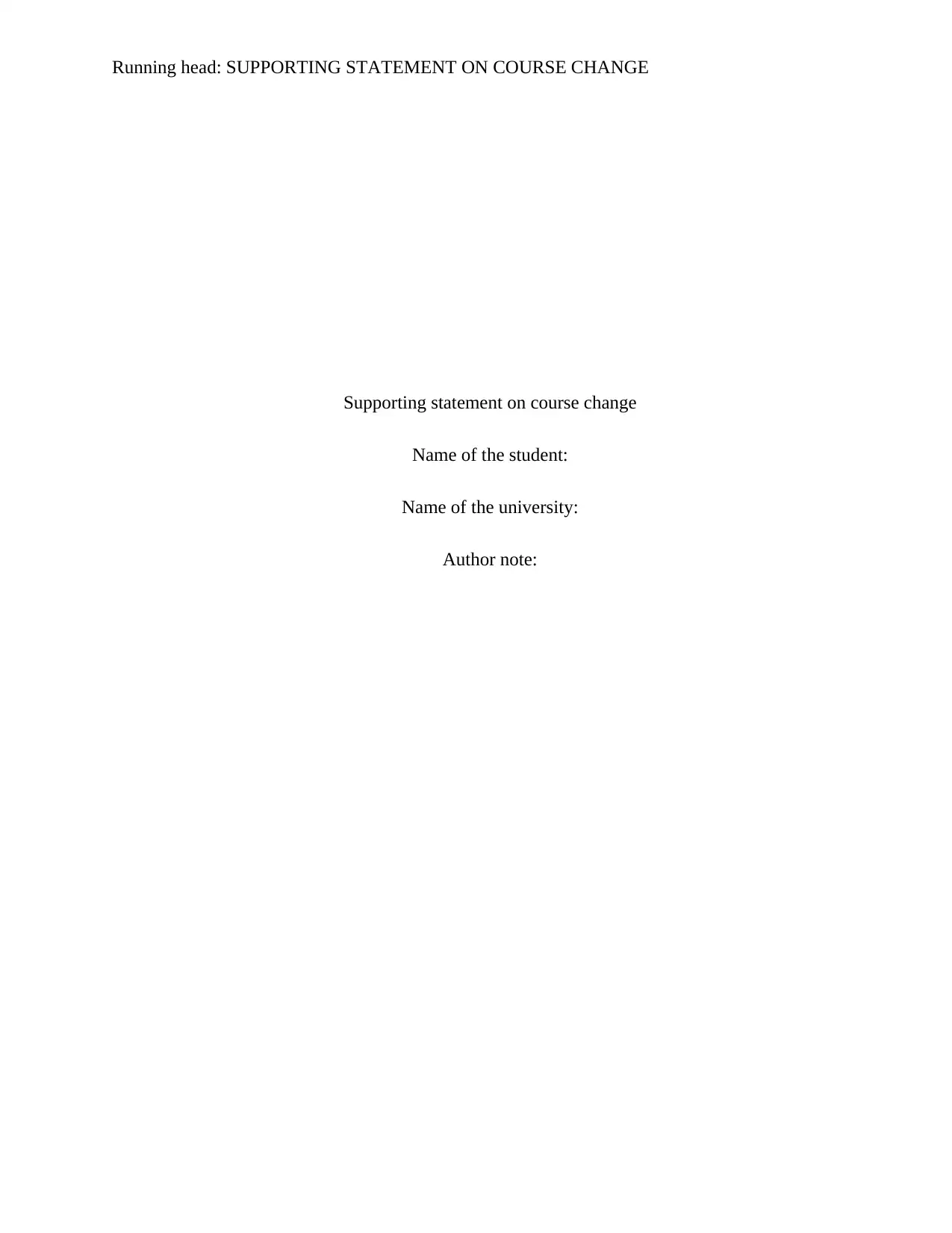
Running head: SUPPORTING STATEMENT ON COURSE CHANGE
Supporting statement on course change
Name of the student:
Name of the university:
Author note:
Supporting statement on course change
Name of the student:
Name of the university:
Author note:
Paraphrase This Document
Need a fresh take? Get an instant paraphrase of this document with our AI Paraphraser
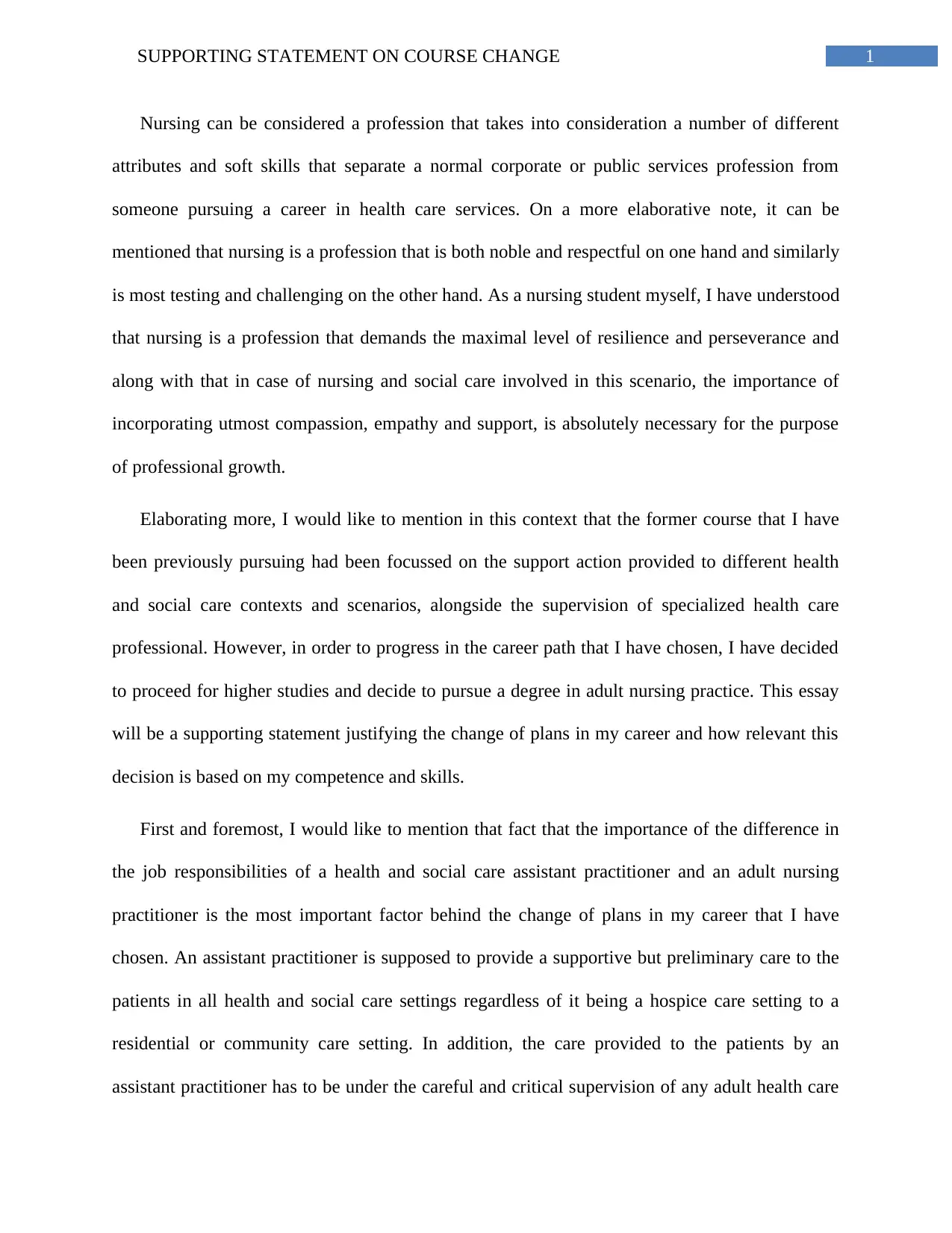
1SUPPORTING STATEMENT ON COURSE CHANGE
Nursing can be considered a profession that takes into consideration a number of different
attributes and soft skills that separate a normal corporate or public services profession from
someone pursuing a career in health care services. On a more elaborative note, it can be
mentioned that nursing is a profession that is both noble and respectful on one hand and similarly
is most testing and challenging on the other hand. As a nursing student myself, I have understood
that nursing is a profession that demands the maximal level of resilience and perseverance and
along with that in case of nursing and social care involved in this scenario, the importance of
incorporating utmost compassion, empathy and support, is absolutely necessary for the purpose
of professional growth.
Elaborating more, I would like to mention in this context that the former course that I have
been previously pursuing had been focussed on the support action provided to different health
and social care contexts and scenarios, alongside the supervision of specialized health care
professional. However, in order to progress in the career path that I have chosen, I have decided
to proceed for higher studies and decide to pursue a degree in adult nursing practice. This essay
will be a supporting statement justifying the change of plans in my career and how relevant this
decision is based on my competence and skills.
First and foremost, I would like to mention that fact that the importance of the difference in
the job responsibilities of a health and social care assistant practitioner and an adult nursing
practitioner is the most important factor behind the change of plans in my career that I have
chosen. An assistant practitioner is supposed to provide a supportive but preliminary care to the
patients in all health and social care settings regardless of it being a hospice care setting to a
residential or community care setting. In addition, the care provided to the patients by an
assistant practitioner has to be under the careful and critical supervision of any adult health care
Nursing can be considered a profession that takes into consideration a number of different
attributes and soft skills that separate a normal corporate or public services profession from
someone pursuing a career in health care services. On a more elaborative note, it can be
mentioned that nursing is a profession that is both noble and respectful on one hand and similarly
is most testing and challenging on the other hand. As a nursing student myself, I have understood
that nursing is a profession that demands the maximal level of resilience and perseverance and
along with that in case of nursing and social care involved in this scenario, the importance of
incorporating utmost compassion, empathy and support, is absolutely necessary for the purpose
of professional growth.
Elaborating more, I would like to mention in this context that the former course that I have
been previously pursuing had been focussed on the support action provided to different health
and social care contexts and scenarios, alongside the supervision of specialized health care
professional. However, in order to progress in the career path that I have chosen, I have decided
to proceed for higher studies and decide to pursue a degree in adult nursing practice. This essay
will be a supporting statement justifying the change of plans in my career and how relevant this
decision is based on my competence and skills.
First and foremost, I would like to mention that fact that the importance of the difference in
the job responsibilities of a health and social care assistant practitioner and an adult nursing
practitioner is the most important factor behind the change of plans in my career that I have
chosen. An assistant practitioner is supposed to provide a supportive but preliminary care to the
patients in all health and social care settings regardless of it being a hospice care setting to a
residential or community care setting. In addition, the care provided to the patients by an
assistant practitioner has to be under the careful and critical supervision of any adult health care
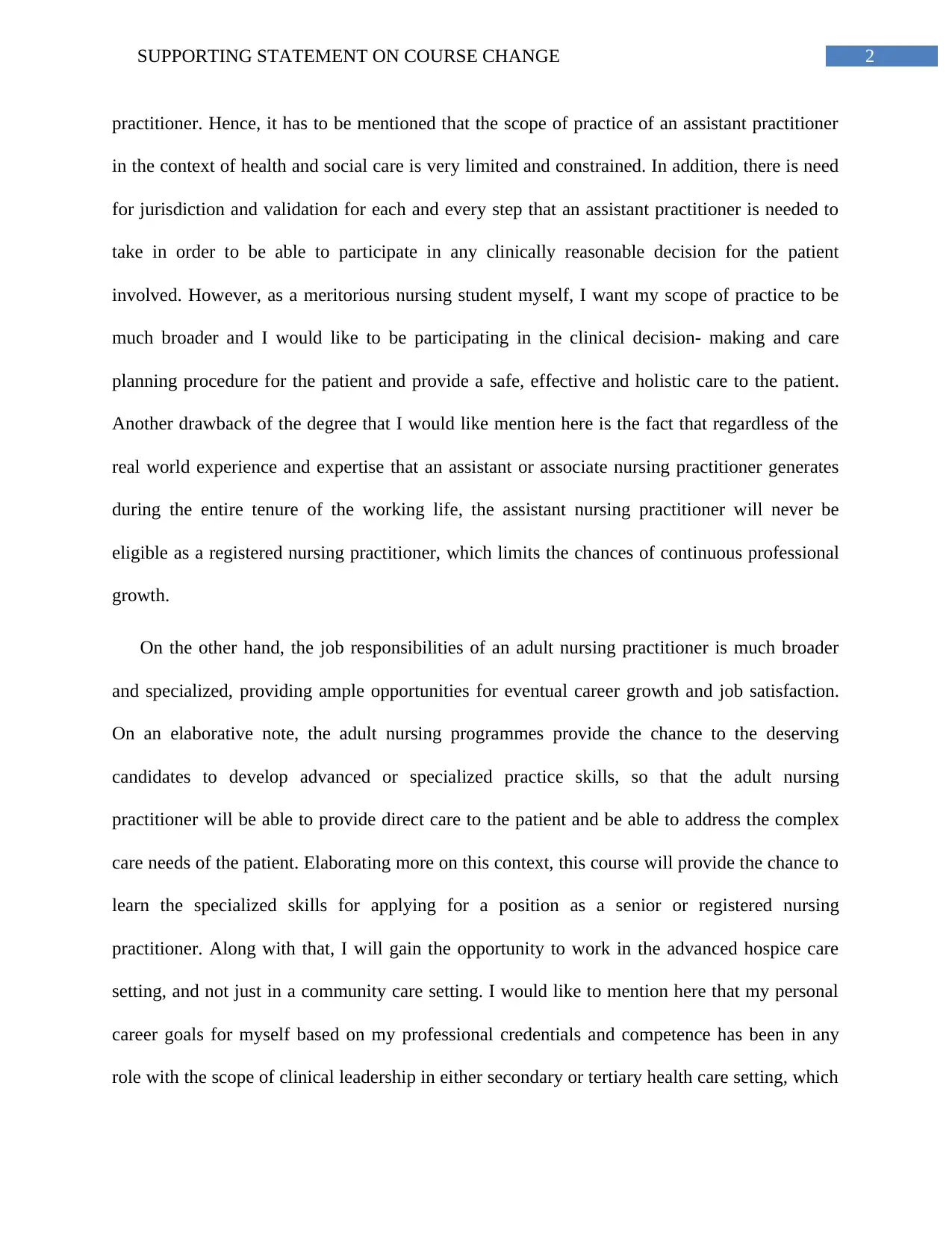
2SUPPORTING STATEMENT ON COURSE CHANGE
practitioner. Hence, it has to be mentioned that the scope of practice of an assistant practitioner
in the context of health and social care is very limited and constrained. In addition, there is need
for jurisdiction and validation for each and every step that an assistant practitioner is needed to
take in order to be able to participate in any clinically reasonable decision for the patient
involved. However, as a meritorious nursing student myself, I want my scope of practice to be
much broader and I would like to be participating in the clinical decision- making and care
planning procedure for the patient and provide a safe, effective and holistic care to the patient.
Another drawback of the degree that I would like mention here is the fact that regardless of the
real world experience and expertise that an assistant or associate nursing practitioner generates
during the entire tenure of the working life, the assistant nursing practitioner will never be
eligible as a registered nursing practitioner, which limits the chances of continuous professional
growth.
On the other hand, the job responsibilities of an adult nursing practitioner is much broader
and specialized, providing ample opportunities for eventual career growth and job satisfaction.
On an elaborative note, the adult nursing programmes provide the chance to the deserving
candidates to develop advanced or specialized practice skills, so that the adult nursing
practitioner will be able to provide direct care to the patient and be able to address the complex
care needs of the patient. Elaborating more on this context, this course will provide the chance to
learn the specialized skills for applying for a position as a senior or registered nursing
practitioner. Along with that, I will gain the opportunity to work in the advanced hospice care
setting, and not just in a community care setting. I would like to mention here that my personal
career goals for myself based on my professional credentials and competence has been in any
role with the scope of clinical leadership in either secondary or tertiary health care setting, which
practitioner. Hence, it has to be mentioned that the scope of practice of an assistant practitioner
in the context of health and social care is very limited and constrained. In addition, there is need
for jurisdiction and validation for each and every step that an assistant practitioner is needed to
take in order to be able to participate in any clinically reasonable decision for the patient
involved. However, as a meritorious nursing student myself, I want my scope of practice to be
much broader and I would like to be participating in the clinical decision- making and care
planning procedure for the patient and provide a safe, effective and holistic care to the patient.
Another drawback of the degree that I would like mention here is the fact that regardless of the
real world experience and expertise that an assistant or associate nursing practitioner generates
during the entire tenure of the working life, the assistant nursing practitioner will never be
eligible as a registered nursing practitioner, which limits the chances of continuous professional
growth.
On the other hand, the job responsibilities of an adult nursing practitioner is much broader
and specialized, providing ample opportunities for eventual career growth and job satisfaction.
On an elaborative note, the adult nursing programmes provide the chance to the deserving
candidates to develop advanced or specialized practice skills, so that the adult nursing
practitioner will be able to provide direct care to the patient and be able to address the complex
care needs of the patient. Elaborating more on this context, this course will provide the chance to
learn the specialized skills for applying for a position as a senior or registered nursing
practitioner. Along with that, I will gain the opportunity to work in the advanced hospice care
setting, and not just in a community care setting. I would like to mention here that my personal
career goals for myself based on my professional credentials and competence has been in any
role with the scope of clinical leadership in either secondary or tertiary health care setting, which
⊘ This is a preview!⊘
Do you want full access?
Subscribe today to unlock all pages.

Trusted by 1+ million students worldwide
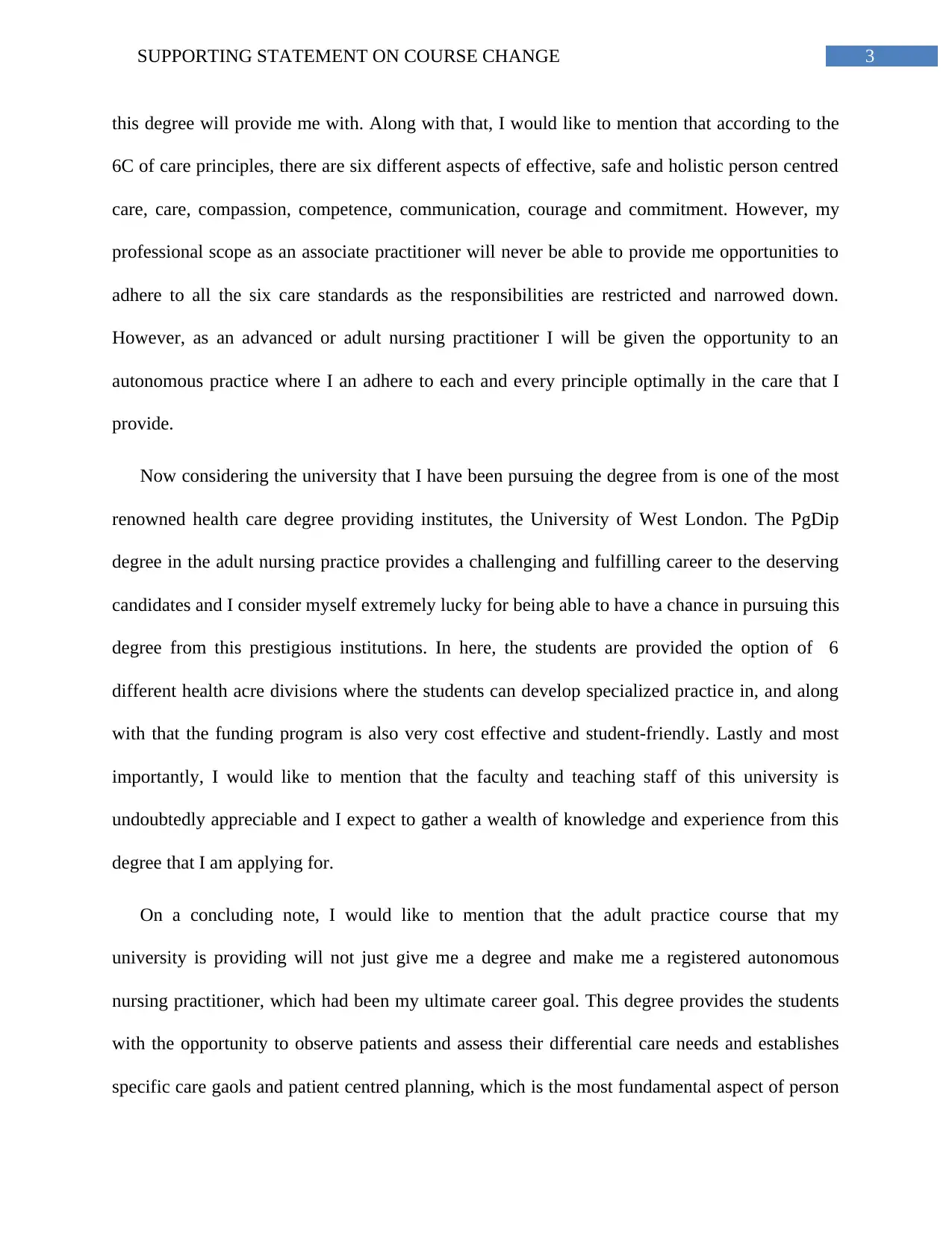
3SUPPORTING STATEMENT ON COURSE CHANGE
this degree will provide me with. Along with that, I would like to mention that according to the
6C of care principles, there are six different aspects of effective, safe and holistic person centred
care, care, compassion, competence, communication, courage and commitment. However, my
professional scope as an associate practitioner will never be able to provide me opportunities to
adhere to all the six care standards as the responsibilities are restricted and narrowed down.
However, as an advanced or adult nursing practitioner I will be given the opportunity to an
autonomous practice where I an adhere to each and every principle optimally in the care that I
provide.
Now considering the university that I have been pursuing the degree from is one of the most
renowned health care degree providing institutes, the University of West London. The PgDip
degree in the adult nursing practice provides a challenging and fulfilling career to the deserving
candidates and I consider myself extremely lucky for being able to have a chance in pursuing this
degree from this prestigious institutions. In here, the students are provided the option of 6
different health acre divisions where the students can develop specialized practice in, and along
with that the funding program is also very cost effective and student-friendly. Lastly and most
importantly, I would like to mention that the faculty and teaching staff of this university is
undoubtedly appreciable and I expect to gather a wealth of knowledge and experience from this
degree that I am applying for.
On a concluding note, I would like to mention that the adult practice course that my
university is providing will not just give me a degree and make me a registered autonomous
nursing practitioner, which had been my ultimate career goal. This degree provides the students
with the opportunity to observe patients and assess their differential care needs and establishes
specific care gaols and patient centred planning, which is the most fundamental aspect of person
this degree will provide me with. Along with that, I would like to mention that according to the
6C of care principles, there are six different aspects of effective, safe and holistic person centred
care, care, compassion, competence, communication, courage and commitment. However, my
professional scope as an associate practitioner will never be able to provide me opportunities to
adhere to all the six care standards as the responsibilities are restricted and narrowed down.
However, as an advanced or adult nursing practitioner I will be given the opportunity to an
autonomous practice where I an adhere to each and every principle optimally in the care that I
provide.
Now considering the university that I have been pursuing the degree from is one of the most
renowned health care degree providing institutes, the University of West London. The PgDip
degree in the adult nursing practice provides a challenging and fulfilling career to the deserving
candidates and I consider myself extremely lucky for being able to have a chance in pursuing this
degree from this prestigious institutions. In here, the students are provided the option of 6
different health acre divisions where the students can develop specialized practice in, and along
with that the funding program is also very cost effective and student-friendly. Lastly and most
importantly, I would like to mention that the faculty and teaching staff of this university is
undoubtedly appreciable and I expect to gather a wealth of knowledge and experience from this
degree that I am applying for.
On a concluding note, I would like to mention that the adult practice course that my
university is providing will not just give me a degree and make me a registered autonomous
nursing practitioner, which had been my ultimate career goal. This degree provides the students
with the opportunity to observe patients and assess their differential care needs and establishes
specific care gaols and patient centred planning, which is the most fundamental aspect of person
Paraphrase This Document
Need a fresh take? Get an instant paraphrase of this document with our AI Paraphraser

4SUPPORTING STATEMENT ON COURSE CHANGE
centred care. With a 99.6% employment rate, this degree will ensure that the students are given
the opportunity to apply and reflect the 6cs of care principles, the primary practice standards of
NHS health care constitution. Hence, I humbly request the university to consider my request to
transfer to adult nursing practitioner degree and be able to fulfil my career goals.
centred care. With a 99.6% employment rate, this degree will ensure that the students are given
the opportunity to apply and reflect the 6cs of care principles, the primary practice standards of
NHS health care constitution. Hence, I humbly request the university to consider my request to
transfer to adult nursing practitioner degree and be able to fulfil my career goals.
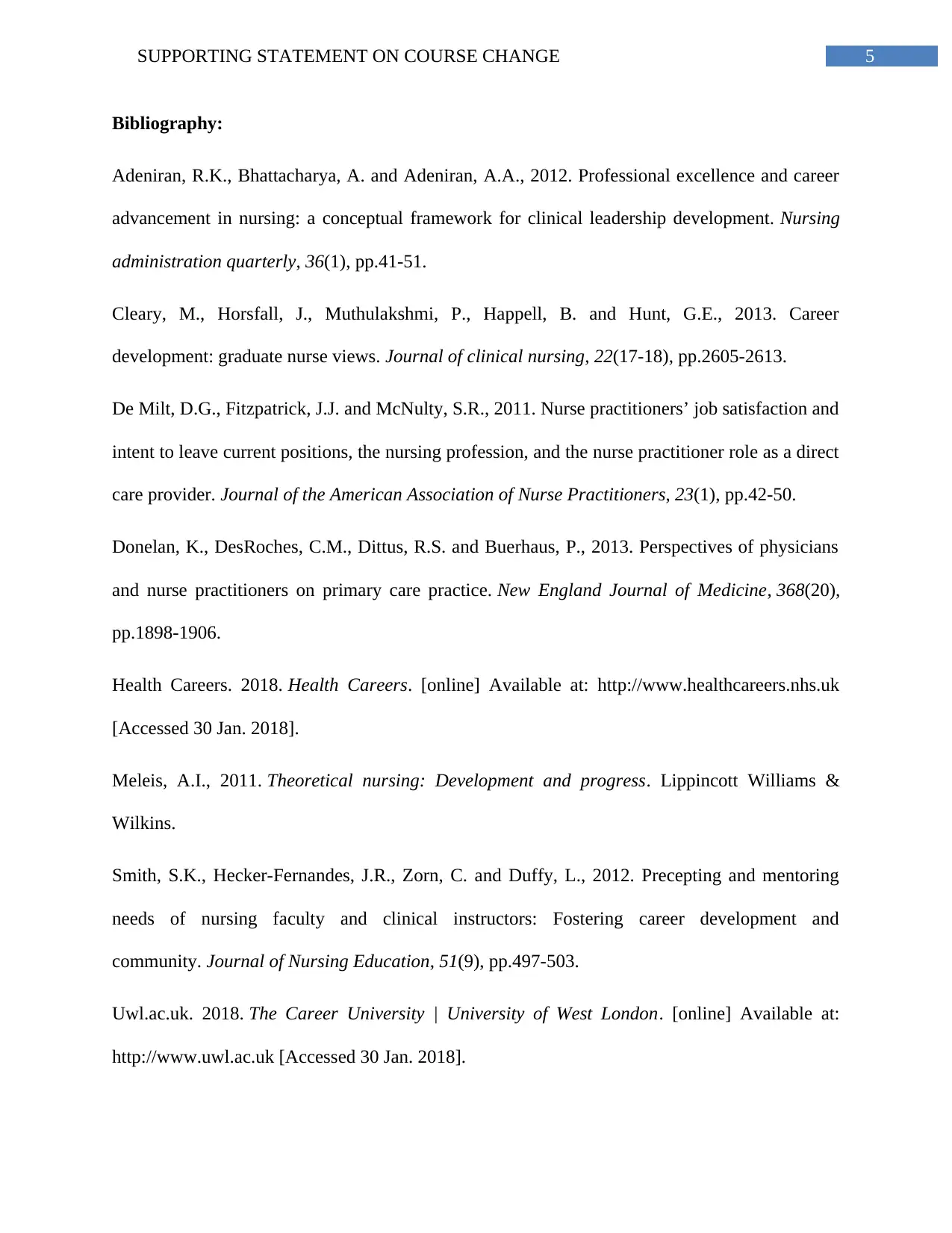
5SUPPORTING STATEMENT ON COURSE CHANGE
Bibliography:
Adeniran, R.K., Bhattacharya, A. and Adeniran, A.A., 2012. Professional excellence and career
advancement in nursing: a conceptual framework for clinical leadership development. Nursing
administration quarterly, 36(1), pp.41-51.
Cleary, M., Horsfall, J., Muthulakshmi, P., Happell, B. and Hunt, G.E., 2013. Career
development: graduate nurse views. Journal of clinical nursing, 22(17-18), pp.2605-2613.
De Milt, D.G., Fitzpatrick, J.J. and McNulty, S.R., 2011. Nurse practitioners’ job satisfaction and
intent to leave current positions, the nursing profession, and the nurse practitioner role as a direct
care provider. Journal of the American Association of Nurse Practitioners, 23(1), pp.42-50.
Donelan, K., DesRoches, C.M., Dittus, R.S. and Buerhaus, P., 2013. Perspectives of physicians
and nurse practitioners on primary care practice. New England Journal of Medicine, 368(20),
pp.1898-1906.
Health Careers. 2018. Health Careers. [online] Available at: http://www.healthcareers.nhs.uk
[Accessed 30 Jan. 2018].
Meleis, A.I., 2011. Theoretical nursing: Development and progress. Lippincott Williams &
Wilkins.
Smith, S.K., Hecker-Fernandes, J.R., Zorn, C. and Duffy, L., 2012. Precepting and mentoring
needs of nursing faculty and clinical instructors: Fostering career development and
community. Journal of Nursing Education, 51(9), pp.497-503.
Uwl.ac.uk. 2018. The Career University | University of West London. [online] Available at:
http://www.uwl.ac.uk [Accessed 30 Jan. 2018].
Bibliography:
Adeniran, R.K., Bhattacharya, A. and Adeniran, A.A., 2012. Professional excellence and career
advancement in nursing: a conceptual framework for clinical leadership development. Nursing
administration quarterly, 36(1), pp.41-51.
Cleary, M., Horsfall, J., Muthulakshmi, P., Happell, B. and Hunt, G.E., 2013. Career
development: graduate nurse views. Journal of clinical nursing, 22(17-18), pp.2605-2613.
De Milt, D.G., Fitzpatrick, J.J. and McNulty, S.R., 2011. Nurse practitioners’ job satisfaction and
intent to leave current positions, the nursing profession, and the nurse practitioner role as a direct
care provider. Journal of the American Association of Nurse Practitioners, 23(1), pp.42-50.
Donelan, K., DesRoches, C.M., Dittus, R.S. and Buerhaus, P., 2013. Perspectives of physicians
and nurse practitioners on primary care practice. New England Journal of Medicine, 368(20),
pp.1898-1906.
Health Careers. 2018. Health Careers. [online] Available at: http://www.healthcareers.nhs.uk
[Accessed 30 Jan. 2018].
Meleis, A.I., 2011. Theoretical nursing: Development and progress. Lippincott Williams &
Wilkins.
Smith, S.K., Hecker-Fernandes, J.R., Zorn, C. and Duffy, L., 2012. Precepting and mentoring
needs of nursing faculty and clinical instructors: Fostering career development and
community. Journal of Nursing Education, 51(9), pp.497-503.
Uwl.ac.uk. 2018. The Career University | University of West London. [online] Available at:
http://www.uwl.ac.uk [Accessed 30 Jan. 2018].
⊘ This is a preview!⊘
Do you want full access?
Subscribe today to unlock all pages.

Trusted by 1+ million students worldwide

6SUPPORTING STATEMENT ON COURSE CHANGE
1 out of 7
Related Documents
Your All-in-One AI-Powered Toolkit for Academic Success.
+13062052269
info@desklib.com
Available 24*7 on WhatsApp / Email
![[object Object]](/_next/static/media/star-bottom.7253800d.svg)
Unlock your academic potential
Copyright © 2020–2026 A2Z Services. All Rights Reserved. Developed and managed by ZUCOL.
![Personal Statement: Adult Nursing Application - University of [Name]](/_next/image/?url=https%3A%2F%2Fdesklib.com%2Fmedia%2Fimages%2Ffc%2F10e7282a88ab4b1dadb62e04a9338668.jpg&w=256&q=75)

![Nursing Personal Statement for University Application - [Year]](/_next/image/?url=https%3A%2F%2Fdesklib.com%2Fmedia%2Fimages%2Ffs%2F8b9dc1d7da2e42a582d59123880456ac.jpg&w=256&q=75)


